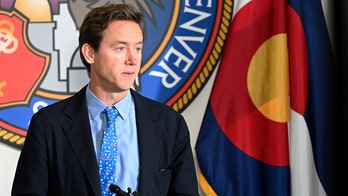Does chaos of Iowa caucuses tarnish Democratic Party brand?
Iowa Democratic Party chairman apologizes, calls failure to deliver results from caucuses unacceptable; reaction and analysis on 'The Five.'
Michigan Democrats, led by Rep. Debbie Dingell, have relaunched a campaign to unseat Iowa as the first state on the presidential nominating calendar after Monday's vote-counting debacle, arguing the current system is broken and it’s time for another state to have a turn at the front.
Dingell, who famously led an effort in 2008 with former Sen. Carl Levin to have Michigan leapfrog other primary states, said she hadn’t intended to revisit that fight, but after the mess in Iowa she’s committed to building a nationwide campaign to dethrone Iowa and New Hampshire and build a primary process that's fairer.
“I’m so on it,” Dingell told Fox News on Tuesday. “I’m done with Iowa and New Hampshire [going first].”
She's already making contact with others around the country and says she intends to force the issue at the Democratic National Committee (DNC) at the start of the 2024 election cycle because other states should shape the presidential election aside from Iowa and New Hampshire.
“No one state should have a lock on going first,” Dingell said. “We need to figure out a system so that everybody has that opportunity.”
Even before Iowa failed to deliver election results on caucus night due to problems with a new app and clogged phone lines, segments of the Democratic Party argued against the Iowa caucuses having so much political clout because the state’s very white population didn’t reflect the diversity of the country, especially Democratic Party voters. Problems with timely caucus voting tallies as recently as 2016 put even more pressure on the state’s first-in-the-nation status.
FEMALE DEM REPS WEAR WHITE TO STATE OF THE UNION TO PROTEST TRUMP'S 'MISOGYNISTIC ATTACKS'
“Let’s get away from these caucuses,” said Rep. Dan Kildee, D-Mich. “And let’s get away from Iowa and New Hampshire, which are really not the kind of states that ought to set the trajectory for presidential candidates."
Michigan would be an ideal first state with its range of agricultural, trade, environmental and racial issues, Kildee argued.
“Obviously, we would want to have Michigan in that role, but even if it’s not Michigan, some state or collection of states that are more representative of the diversity of this country and would force candidates to deal with the kinds of issues that we’re facing,” Kildee said.
The advantage of starting the presidential season off in Iowa and New Hampshire is that they are smaller and less expensive states in which to campaign and give candidates a chance to hone retail politics, as opposed to traditional blue bastions such as California and New York.
Both Iowa and New Hampshire are more than 90 percent white, whereas the Democrat electorate nationwide is increasingly diverse. Michigan is about 78 percent white, which is on par with percentages nationally.
“We are a state of 10 million people. We are a diverse state. And we would happily be the No. 1 [state],” Sen. Debbie Stabenow, D-Mich., told Fox News. “I think it would make sense.”
Iowa, as well as New Hampshire, will fiercely defend their cherished status on the primary calendar, however, and home-state members of both parties have already started fighting back against the revived criticism.
“Iowa’s unique role encourages a grassroots nominating process that empowers everyday Americans, not Washington insiders or powerful billionaires. The face-to-face retail politics nature of Iowa’s caucus system also encourages dialogue between candidates and voters that makes our presidential candidates accountable for the positions they take and the records they hold,” Sens. Chuck Grassley and Joni Ernst, both Iowa Republicans, said in a statement Tuesday.
Michigan created a lot of mischief for the primary election process in 2008 when the state moved up its presidential primary to Jan. 15 in defiance of the DNC and Republican National Committee in an effort to gain more political clout. Dingell and Levin argued at the time that Iowa and New Hampshire had too much influence.
Iowa moved up its caucuses to Jan. 3, 2008, to retain its first-in-the-nation status and New Hampshire upped its primary to Jan. 8 that year in order to retain the second slot.
CLICK HERE TO GET THE FOX NEWS APP
Dingell said it’s time the DNC makes reforms to address this long-standing issue.
“We’ve got to get through this election, but we have got to do this at the beginning of the next cycle,” Dingell said. “…I’m doing it in Carl Levin’s name, who identified this as a problem 30 years ago.”






